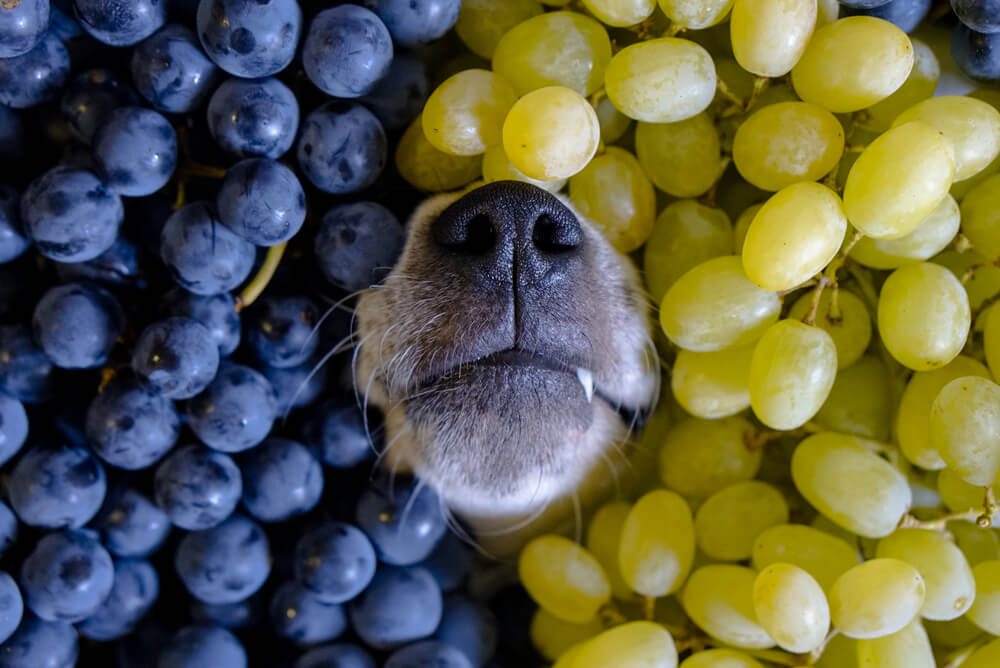Hey Ollie blog readers! We’re offering you an exclusive 60% OFF your starter box! Try now!
While you might love to share healthy snacks with your dog, guard your pups against grapes!
The ASPCA Animal Poison Control Center (APCC) received 3,722 calls, or cases, involving grapes and raisins in 2016, out of a total of 180,639 total cases that year.
We dug in and asked the experts why it is so critical to keep grapes away from your pup and what to do if your dog does find a way to steal a grape.
Can Dogs Eat Grapes?
No, dogs should never eat grapes. Grapes and raisins are known to be toxic to dogs, even in small amounts. While some dogs may eat a grape and seem fine, others can have a severe reaction after just one. Because there’s no way to predict how a dog will respond, it’s safest to avoid grapes altogether.
The toxic substance in grapes hasn’t been identified yet, but the effects are serious. Ingesting grapes can lead to vomiting, diarrhea, lethargy, and—in severe cases—acute kidney failure. Some dogs have even died from eating just a handful of raisins or grapes.
If your dog eats a grape, contact your vet or an emergency pet poison hotline immediately. Early treatment can help prevent long-term damage. Grapes may seem like a healthy snack for humans, but for dogs, they’re a dangerous mistake. Stick to dog-safe fruits like blueberries, apples (without seeds), or bananas instead.
Why Are Grapes Dangerous For Dogs?
Grapes—and their dried form, raisins—are highly toxic to dogs. Even small amounts can lead to serious health problems, including sudden kidney failure. What makes grapes toxic is still not fully understood, but the reaction can happen in any dog, regardless of breed, age, or size.
Some dogs may show symptoms like vomiting, diarrhea, tiredness, or loss of appetite just a few hours after eating grapes. In more severe cases, dogs can develop abdominal pain, dehydration, and stop producing urine, which is a sign of kidney failure. This can be life-threatening if not treated quickly.
Because there’s no safe amount, grapes and raisins should always be kept far out of your dog’s reach. If you think your dog has eaten any, call your vet or an emergency animal poison line right away. Fast action can make a big difference. When it comes to grapes, it’s always better to be safe and avoid them entirely.
What about red or green grapes? Does color matter?
Both red and green grapes should not be offered to dogs. It does not matter what color the grape is or if it is an heirloom variety. There are many ‘new’ grapes like Cotton Candy Grapes or Witches’ fingers that have been created through breeding. None of these are good for your dog. There are plenty of other fruits and vegetables that are safe for you to share with your pet.
What about grape juice?
While it seems that the toxin is found in the flesh of the grape, there is not conculusive evidence that grape juice makes dogs sick. Most veterinarians recommend that you don’t give your dog grape juice or even worse, wine. As you probably know, wine is simply grape juice that has been fermented. This means it now contains alcohol which is also not good for your pup.
Can dogs eat grapeseed?
Okay this one is a little more complicated, as we mentioned whatever is manking dogs sick from grapes is not found in the seeds. Some pet owners do use grapeseed oil with their pets with success. Use caution when sharing anything with grapeseed oil with your dog. Grapeseed oil is high in Omega-6 fatty acids. Too much Omega-6 can lead to inflammation, which is not something you want for your pup.

Why can’t dogs eat grapes?
According to the American Kennel Club, “Grapes and raisins are known to be highly toxic to dogs, though research has yet to pinpoint exactly which substance in the fruit causes this reaction. Because of that, peeled or seedless grapes should also be avoided.”
Additionally, it is not known how many grapes a dog will need to eat to get sick. Some dogs can have a few grapes and be fine, whereas others will get sick after eating a single grape or raisin. So even if your pet has only eaten a single grape or raisin, it can still cause them to get very sick. While this may be less true in larger dogs, you do not want to take the chance.
Grapes cause kidney failure in dogs, which can be fatal if not treated.
“The problem with grapes and raisins is we don’t know WHY they cause renal failure, just that they do. We don’t know WHAT dogs will be affected, just that some eat grapes their whole lives and some get a couple and go into kidney failure” says Dr. Katie Swales, DVM a veterinarian at Rainbow Vet in Darlington, PA.
Make sure that everyone in your house: all pet caregivers, children, and anyone who comes in contact with your dog are aware that they can not feed grapes to your dog. If you are hosting a brunch or dinner at your home and you are serving grapes, you should give everyone a friendly reminder not to feed them to the dog. You should also monitor the dog carefully to make sure they don’t steal a grape or find one that was dropped on the floor.
You may also want to share with people who regularly spend time with your dog a list of toxic foods for dogs to make sure there are no mishaps.
What should you do if your dog eats grapes?
If your dog has consumed grapes or raisins, contact your vet’s office immediately. Since dogs tend to do these things at the worst times. If your vet’s office is closed follow their directions and contact the closest emergency facility. You can also call the Animal Poison Control Hotline in the meantime.
You want to be watching your dog for the following symptoms:
- Vomiting
- Diarrhea
- Increased thirst
- Decrease in urination
- Abdomen is tender to the touch
- Weakness
Even if your dog is not displaying any of these symptoms, you should not wait until they do. In this situation, the sooner you get your pet to the vet for treatment, the better.
What is the treatment for grape poisoning?
If your dog has just eaten the grape, you may be instructed to induce vomiting to remove the grape. This could physically remove the grape from the dog’s stomach or at least help to slow down the spread of toxins. This is not advised if your pet is having trouble breathing or is already in distress. When you call the vet, make sure to provide them with a detailed timeline (when the dog ate the grape or your best guess) and any symptoms your dog is experiencing.
Your vet will work to stabilize your dog. This could include inducing vomiting, pumping the dog’s stomach, and providing treatments to support the kidneys.
The Ollie blog is devoted to helping pet parents lead healthier lives with their pups. If you want to learn more about our fresh, human-grade food, check out MyOllie.com.
Tagged As:

The nutrition your dog needs,
the food they want.

Enjoying our articles? Subscribe our Newsletters and get new articles directly to your inbox
You might also like
26 August 2025
4 MINS READ
Can I Make Fresh Dog Food Myself Instead?
If you’re thinking about switching your dog to a fresh food diet, you might be wondering: “Should I buy fresh dog food or make it at home?” It’s a fair question. Many pet parents like the …
by Ollie Pets
26 August 2025
4 MINS READ
Is Fresh Dog Food Safe?
If you’re thinking about switching your dog to a fresh food diet, you might be asking yourself: “Is fresh dog food safe?” It’s a smart question—because feeding fresh means you’re worki…
by Ollie Pets
26 August 2025
4 MINS READ
How Do I Know How Much Fresh Dog Food To Feed?
If you’ve switched your pup to fresh food, you’re probably wondering: “How much fresh dog food should I feed?” It’s not as simple as scooping kibble from a bag—fresh food is more nutri…
by Ollie Pets







